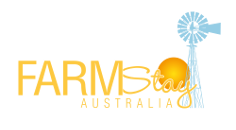Always treat people and their properties respectfully. They are sharing their backyard with you.
Always leave gates how you found them.
Only leave footprints and take nothing but your memories and photographs.
If you see any rubbish, pick it up to help keep our country beautiful.
Pet Friendly Properties:
Many members of Farmstay Australia are pet friendly, please check and confirm with property owners beforehand.
Most property owners will want to know the breed of your pet and request its on a lead at all times.
Please keep your pet under control at all times.
Many of the farms & stations cover vast areas and finding a lost pet would be difficult, neither yourself nor the property owner need the stress of this problem arising.
There is also more chance of your pet taking flight due to an unexpected visit from a farm animal, gunshot, aircraft or storm, hence having your pet restrained is best.
Don’t let dogs run off their leads if they dont listen to your commands, they run through campsites, urinate on items, it’s disrespectful to other travellers and not all travellers like dogs or may be allergic to animals.
Always pick up any pet droppings and dispose of correctly.
Please be aware some breeds may be restricted or denied to visit at pet friendly properties due to stock or other pets on property being put at risk. (This could apply to large or hunting breeds of dogs)
Please be understanding to these policies, your pet may have never been a problem before at any time, though it is the property owners final decision.
Many places in Australia use 1080 baits for controlling foxes and wild dogs. Never let your dog free to run, there are usually signposts to warn pet owners of the baits, though birds have been known to pick them up and drop them in unlikely places. There is no remedy for 1080 poison and is a painful way to lose a pet.
Travel Safety for your Pets:
Never leave your dog unattended in your car on a warm day, even in the shade. It does not take long for the inside of a car to heat up to the point it could be harmful to your pet or fatal.
For the safety of you and your pet, a restraint such as a lead or harness should always be used in the vehicle. Harnesses are a safer option in case of sudden braking to reduce damage to their throat and larynx. It stops the pet flying forward should you need to break hard or in the event of an accident when someone else opens the vehicle the pet wont escape.
Rubbish Disposal:
Take your rubbish with you and dispose of it at the next town, this helps the property owner with less workload.
Recycle wherever possible.
Never feed wild animals, dingoes, possums etc.
Always have your rubbish securely away at night to stop the risk of scavenging animals.
When planning a trip, try to pack to minimize rubbish, good quality wine now comes in cardboard bottle size packs and often sauces and stirfry mixes come in small sachets which helps to minimize waste and also reduces the extra weight of carrying glass.
Respect the environment, never leave any rubbish nor burn your rubbish (only paper/cardboard) as often residue is left behind.
Clean up if any other campers have been lazy, it then makes it more pleasant for the next visitor and property owner.
Dispose of toilet paper in the bush thoughtfully. Either burn it or take it with you.
Camp Fires:
Check with the property owners that its fine to have a campfire.
Always ensure its fully distinguished before going to bed and on leaving the campsite for your next destination. It’s best not to light fires on windy nights to reduce the risk of an out of control fire.
Vehicle Preparation & Personal Safety:
Always have your vehicle and tow vehicle fully serviced and suspension checked before leaving on your trip. Never leave anything to chance.
Recommend to have UHF Radio installed in your vehicle
Carry a compressor with a long enough hose to get to the rear tyres of your camper or caravan.
If you are going into a remote area, buy or hire a satellite phone & epirb.
